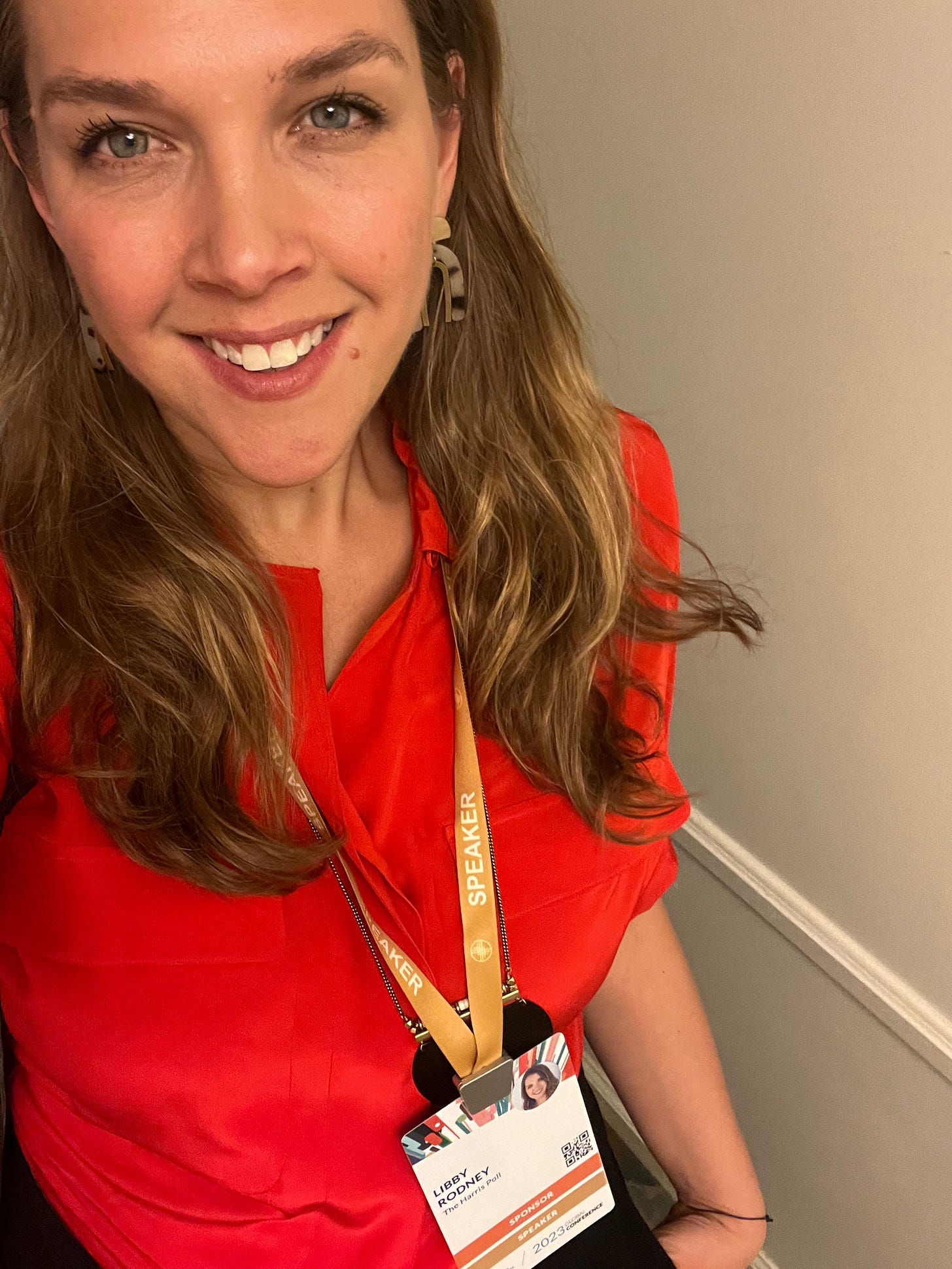The Milken Institute '23: Accountability On Top + The Potential for Psychedelics, AI, Trust +
Special focus on our fourth annual Listening Project data and learnings from The Milken Institute Global Conference 2023.
The Next Big Think! will usually send you one number, two insights, and three links to keep you ahead of societal shifts. But this week, we shifted to cover Milken.
2 Insights
#1. Accountability On Top, Generational Tailwinds
This is our fourth year of The Milken Institute Harris Poll Listening Project, which focuses on the simple premise of what issues, if solved, would build more meaningful lives for people, their families, and communities worldwide.
For this installment, we shifted our focus to a more domestic yet systemic problem – gender inequity in corporate America. This comes at a time when 74% of Millennial women say, “Society treats women like second-class citizens.’’ And quarter of BIPOC women report not being paid fairly and comparable to other colleagues at their level and across their company, 1.5x more often than white men. (source: theSkimm, Hue)
The truth is we don’t want to be doing this research over and over; we delivered a shattering women's inequality report for Paul Polman’s Davos speech in the mid-2010s before the “me too” movement, and while some things have changed other things have stalled out. We want change, and apparently, so do executives.
What you’ll see in the research are three things.
A dysfunctional system across the pipeline
A signal of optimism- generational tailwinds
A demand for accountability from the executive level
You can read the whole report here; below are some highlights.
What the data tells us:
A dysfunctional system
This probably won’t surprise you; it’s more like a somber reality; the funnel is rife with systemic inequity, and women at all levels are exhausted.
Young women can’t see the path toward advancement; 9 in 10 face barriers towards advancement.
At the managerial level and higher, over 7 in 10 women feel like they are “expected to do twice the work as others around me to get a promotion” and have “limited resources to find mentors or sponsors to grow my career”
And at the executive level, women feel burnout from the "double shift" of doing their job and championing DEI initiatives alone.
A signal of optimism- generational tailwinds
Tailwinds lie in generational value shifts of Gen Z/ Millennials, who believe in championing the success of women and BIPOC employees in the workplace
7 in 10 of young women and men under 41 years old say
It’s everyone’s responsibility to help women succeed in their careers
It’s everyone’s responsibility to help people of color to succeed in their careers (74% under 41, vs only 58% of people over 42)
And that the status quo isn’t serving anyone well in the workforce
Over half of young women and men, say that in the NEXT YEAR they want
CEO performance to be judged on DEI initiatives
Equalization of gender pay for current employees
Increased focus on attracting and retaining female talent.
A demand for accountability from the executive level
The third big takeaway comes from The Milken Institute Executive Circle, where we sourced ideas and solutions from women executives on how to move the needle and rewire the system. The circle clearly focused on future accountability and gave a range of levers that could be pulled to interrupt the systemic cycle of inequity.
What to think about:
Inequity issues aren’t just women's issues or marginalized community issues; they are business issues. It’s been proven that diversity in the executive suite and board improves businesses’ ability to innovate, avoid groupthink, and beat the market. Yet, here we are, still stuck in the cycle.
I was sitting in a meeting about board diversity, and there was an acknowledgment that businesses can act rapidly if they want to, as we saw in the pandemic, yet this issue is reported to not feel as urgent to many of the current leaders on top. But what if it did? What could we change if we looked at these issues with a different sense of urgency or foresight? If we could shift from a drip of change to an avalanche and see more BIPOC, LGBTQIA, and women on top, as one of the board panelists suggested?
When you have women CEOs, they actively and organically shift the culture to be more intentional about bringing others along. Some examples from the panelist the inspired me:
Hanneke Smits, CEO of BNY Mellon Investment Management, is the Global chair of the 30% Club that is on a mission to ensure a minimum of 30% female representation at the board and executive committee levels ( 30% is where research shows minority voices are heard, but overall the goal is gender parity).
Cheryl Alston, CEO of Dallas Employees Retirement Fund, talked about how she created a company culture she always dreamed of; performance-driven and lifestyle orientated. For example, she set the performance goal that as long as her firm hit 95 points in service ratings or above, they have the flexibility to work how they would like (with a minimum of 40 hours logged in person a month). Apparently, her organization is motivated by this goal as they flex a strong 97/100. This reminds me of teachers who grant you the benefit of the A at the beginning of the semester.
Judith Monroe, CEO of the CDC talks about how she was able to recruit top talent just by letting a female candidate bring her infant to the job interview, so she could breastfeed her child, which no other residency allowed. Judith was able to secure top talent by doing what made sense to her organically, a win-win for everyone.
John Gerzema, Harris’ CEO has been championing women's inequity issues for decades, wrote the Athena Doctrine, and sits on boards that champion equity issues.
#2. A Collection of Interesting Ideas from Milken
From the future of psychedelics, AI, trust, travel, longevity, and equity gaps, I learned so much and many wonderful conversations; here are some highlights:
⚕️The Potential of #Psychedelics: Zero Trauma by 2070
➡️ The potential of psychedelics paired with mental health therapy could create a 'zero trauma' world by 2070 (while that sounds far off MDMA will likely be approved by the FDA for therapeutic use in '24).
➡️ One quote that stuck with me a: “Psychedelics (will) be for psychiatry what the microscope is for biology or the telescope is for astronomy” - Stanislav Grof
➡️ Interested in learning more check out Tara Mind, https://lnkd.in/gyG7P7EU or Rick Doblin's Ted Talk
🦾 Interesting #AI Ideas/Concepts: UI Shifts, Computing Power Race, Eras, Ethics
➡️ AI is poised to disrupt the UX/UI experience in the future, shifting from [type-based / screen interfaces] to [voice command and direction]. Experts said this is a revolutionary platform shift, similar to how we went from the web (Yahoo!) to mobile (Uber), where there were winners and losers based on who could pivot their business to take advantage of the new platform. In the future, businesses will have to redesign their experiences to be AI-native/AI-first or get left behind.
➡️ The arms race isn’t just about AI engineering; it’s really a computing power race. You have to have enormous computing power to run these intense large language models (LLM), and people have found that the more data you add to the LLM, the more accurate the output becomes. The challenge here is that it’s expensive to run this computing power; companies are spending billions just on computing power, which means only a few key players will likely be at the top of the AI race (it will be challenging for a new entry player to build a new AI system from the bottom up). There is a looming question; will a true open-source AI player emerge?
➡️ Eras → Human era (past), hybrid era man/machine (now), machine era (future 😱 2050)
➡️ Note that some experts disagree on the timeline that AI will impact industries, especially highly regulated industries, like healthcare, where there is a ‘zero tolerance’ policy for ‘delusional’ computer-based outputs.
➡️ ETHICS! Guardrails- four ethical concerns that need to be addressed now because the race is on and not slowing down:
Discrimination- how do we handle AI amplifying racial and social bias?
Offensive/harm -- how do we handle AI if it perpetuates harm?
Workforce question-- how do we handle a workforce population that AI can replace?
Safety question-- will AI give bad actors knowledge to harm others? How do we handle that?
🤝 Rebuilding Trust By Doing
Move beyond politicized words and get people doing the work. It’s actively engaging in the work that helps people build individual and community trust. That’s the message from the phenomenal Nazanin Ash, the CEO of Welcome.Us, whose non-profit was able to sign up more Americans to become 'welcomers' to displaced refugees in the US in one month period than the US government did in the previous five years.
🧘♀️Reimagining Aging via Midlife
➡️ We have a $750B anti-aging industry, but where is the pro-aging industry? Chip Conley, founder of Modern Elder Academy (previously AirBNB), thinks there is a big opportunity to reframe mid-life and recognize the power of aging (e.g., we get happier, we have crystallized intelligence, we are better at bigger thinking, we have time affluence, etc.). MEA not only offer retreats for people working on sorting out what’s next for them, but they are also working on regenerative co-living communities (think like-minded mid-lifers who want more community and a different way of living).
✈️ Travel surging back
➡️ Travel in the US is surging (in NY, 1MM more tourists than pre-pandemic), and leaders in the industry see no signs of travel slowing down. A big challenge is how travel infrastructure will keep up with the demand. One expert said it’s like trying to “change the wheels on the bus while it’s going 100 miles an hour.”
➡️ Other interesting things: after spending more time in lockdown than the rest of the world, the Chinese consumer is expected to have longer-term psychological side effects; so far, they’ve prioritized domestic travel and safety concerns.
➡️ And last, Craig Billings, CEO of Wynn Resorts, heeded the rush to digitize everything in travel, saying, “When tech becomes a substitute for a service that is not a good outcome, when tech becomes a customer service choice that’s a good outcome,” meaning it's great you can self-check-in, but for others who want to interact with guest services they should have the choice to do so.
3 Links
Airbnb let its workers live and work anywhere. Spoiler: They're loving it (NPR)
These AI-powered glasses transcribe speech in real-time, helping deaf people read conversations (WEF)
Bad Bunny’s Next Move (Time)— “Bad Bunny is perhaps the world’s first reverse crossover artist, whose success comes from a refusal to cater to the mainstream. His stubborn originality, independence, and fiercely local lens have made him a radically new kind of global pop star, etching pathways to success that completely bypass New York or Hollywood industry gatekeepers.”
Curiosity is contagious; if you like this newsletter, please share it!!
Penned by Libby Rodney and Abbey Lunney, founders of the Thought Leadership Group at The Harris Poll. To learn more about the Thought Leadership Practice, just contact one of us or find out more here.









